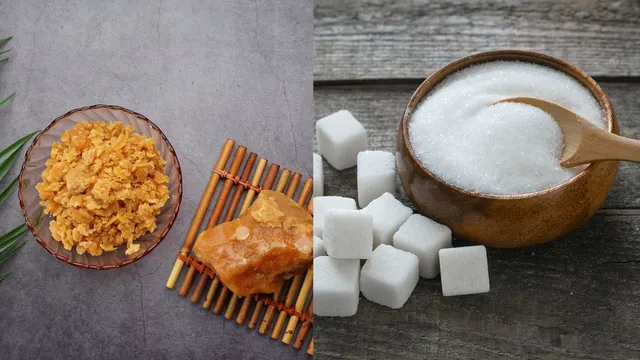- By Priyanka Munshi
- Thu, 26 Sep 2024 05:29 PM (IST)
- Source:JND
Jaggery is one of the most natural sweeteners made from sugarcane juice and is often considered a healthier alternative to refined sugar. Jaggery, or "gur," is especially beneficial if you're on a weight loss journey. Unlike white sugar, which is highly processed and stripped of essential nutrients, jaggery retains vital nutrients like iron, potassium, calcium, and magnesium. These nutrients help in boosting energy, improving digestion, and maintaining a healthy metabolism.
Jaggery is also known for its detoxifying properties, helping to flush out toxins from the body, making it a great option for promoting overall health. Additionally, its low glycemic index means it causes a slow rise in blood sugar levels, reducing sudden spikes. However, it’s essential to remember that jaggery, while healthier than sugar, is still high in calories. Are you still considering switching from sugar to jaggery? Here's what an expert has to say. In a conversation with Jagran English, Dr. Rajeshwari Panda, Head of the Dietetics Department at Medicover Hospital in Navi Mumbai, discussed the comparison between jaggery and sugar for weight loss.
According to Dr. Rajeshwari, the debate over whether jaggery is a healthier alternative to sugar for weight loss has been ongoing. Many believe that jaggery, a traditional sweetener derived from unrefined sugarcane, is better due to its nutritional benefits and lower glycemic index. But is this truly the case? Let’s explore the pros and cons of both sweeteners from a dietitian's perspective.
Nutritional Comparison
While jaggery contains some micronutrients like iron and potassium, it’s important to note that the amounts are relatively small. When comparing the macronutrient profiles of jaggery and sugar, both are essentially identical, being primarily composed of carbohydrates.
Also Read: 6 Habits Linked To Lower Teen Anxiety | Know From Expert
Glycemic Index (GI)
Jaggery is often touted as superior due to its lower glycemic index (GI), which measures how quickly a food raises blood sugar levels. A lower GI food leads to a more gradual rise in blood sugar, potentially aiding in weight management. However, studies suggest that the difference between jaggery and refined sugar in terms of GI is often negligible.
Calorie Content
In terms of calories, both jaggery and sugar are similar. A teaspoon of either sweetener contains approximately 16-18 calories. Therefore, if you're trying to reduce calorie intake for weight loss, it’s essential to limit your consumption of both.
The Role Of Portion Control
The key to weight loss lies in maintaining a calorie deficit. Whether you choose jaggery or sugar, consuming excessive amounts will lead to weight gain. The most effective approach is to practice portion control and limit your overall intake of added sugars.
Also Read: Signs Of Genital Herpes: Expert Lists Warning Signs To Never Ignore
Lastly, Dr. Rajeshwari stated, while jaggery may offer some additional micronutrients compared to refined sugar, the differences in terms of calorie content and glycemic index are minimal. The most significant factor impacting weight loss is overall calorie intake. To achieve sustainable weight management, focus on consuming a balanced diet rich in whole foods, limiting added sugars, and engaging in regular physical activity. If you're concerned about your sugar intake or have specific dietary needs, consulting with a registered dietitian can provide personalized guidance.

